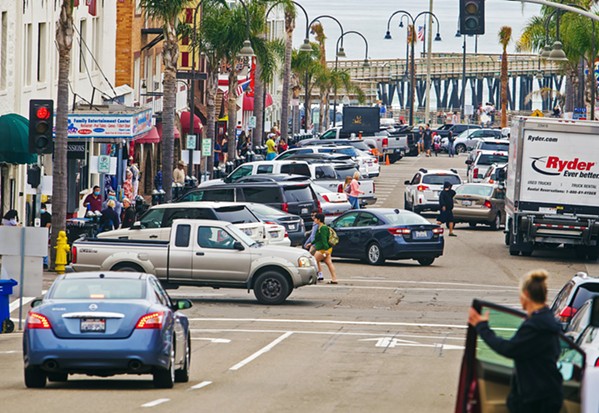Restaurants in Pismo Beach can enjoy their pandemic-enabled parklet program well into the summer while city officials deliberate whether to make it permanent.
After a conflicting and confusing meeting on Feb. 1, Pismo Beach City Council voted to extend the temporary restaurant parklet program to Sept. 30, with Councilmember Sheila Blake dissenting. Approved in August 2020, the program was set to expire on April 30.

- File Photo By Jayson Mellom
- PRICEY PARKLET What used to be parking spaces in downtown Pismo Beach are now parklets, which the city is talking about making permanent and charging $580 per parking space.
Pismo Beach's current Local Coastal Program (LCP) doesn't allow for parklets, but city staff hoped that a council-approved mockup of a permanent program would buy them enough time to update the LCP and also get California Coastal Commission approval.
But Councilmembers Blake and Mary Ann Reiss and Mayor Ed Waage were conflicted. Waage cited poor timing and said working on a blueprint for a permanent parklet program would spread city staff thin, especially when updates to the LCP and general plan are already due. Councilmember Scott Newton disagreed.
"My biggest fear is that if these all go away, we're gonna end up in the same mess we were in before. We're going to have to-go containers all over the beach," Newton said at the meeting.
Newton also expressed concern over how much parklet permits would cost restaurants to apply for if the program becomes permanent. According to the staff report, 30 parklet spaces are up for grabs on a lottery basis. Restaurant owners would have to pay $580 per parking space, and then some.
If they opt for a predesigned parklet, owners would be charged a one-time administrative coastal development permit fee of $673, plus a $220 encroachment fee. However, a custom-designed parklet could leave their wallets $3,402 lighter for a coastal development permit application fee in addition to the encroachment fee.
Matthew Downing, the community development director, informed the City Council that one local restaurant wasn't willing to pay the fees set by the city. This was a point of worry for Councilmember Blake.
"Does that mean they'll be serving less food, or playing loud music, and doing all the things they shouldn't be doing?" she asked at the meeting.
Left in a stalemate, Newton recommended a "middle ground" where existing temporary parklet permits are extended to September. Though the motion eventually passed, this suggestion was met with initial resistance from Waage who questioned whether COVID-19 would still be troubling later in the year.
"If we're out of COVID, there's no legal basis to do it," Waage said. "My crystal ball is no better than yours. The numbers are coming down, fortunately. So, the omicron spike may be coming down in this county, as it is elsewhere."
Blake, who voted against extending the temporary parklet program, mentioned another result of the pandemic, which she said informed her decision.
"We may be in for a rough ride with the economy, with commodities going up by 30 percent. There's going to be a dip, and we're going to have to brace ourselves for it. Some of the restaurants will have to suffer for it also," she said. Δ
Comments
Showing 1-1 of 1